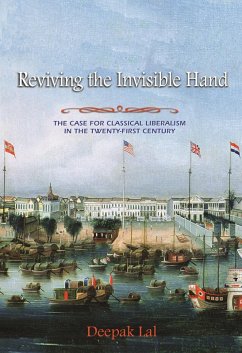Reviving the Invisible Hand is an uncompromising call for a global return to a classical liberal economic order, free of interference from governments and international organizations. Arguing for a revival of the invisible hand of free international trade and global capital, eminent economist Deepak Lal vigorously defends the view that statist attempts to ameliorate the impact of markets threaten global economic progress and stability. And in an unusual move, he not only defends globalization economically, but also answers the cultural and moral objections of antiglobalizers.
Taking a broad cross-cultural and interdisciplinary approach, Lal argues that there are two groups opposed to globalization: cultural nationalists who oppose not capitalism but Westernization, and "new dirigistes" who oppose not Westernization but capitalism. In response, Lal contends that capitalism doesn't have to lead to Westernization, as the examples of Japan, China, and India show, and that "new dirigiste" complaints have more to do with the demoralization of their societies than with the capitalist instruments of prosperity.
Lal bases his case on a historical account of the rise of capitalism and globalization in the first two liberal international economic orders: the nineteenth-century British, and the post-World War II American.
Arguing that the "new dirigisme" is the thin edge of a wedge that could return the world to excessive economic intervention by states and international organizations, Lal does not shrink from controversial stands such as advocating the abolishment of these organizations and defending the existence of child labor in the Third World.
Taking a broad cross-cultural and interdisciplinary approach, Lal argues that there are two groups opposed to globalization: cultural nationalists who oppose not capitalism but Westernization, and "new dirigistes" who oppose not Westernization but capitalism. In response, Lal contends that capitalism doesn't have to lead to Westernization, as the examples of Japan, China, and India show, and that "new dirigiste" complaints have more to do with the demoralization of their societies than with the capitalist instruments of prosperity.
Lal bases his case on a historical account of the rise of capitalism and globalization in the first two liberal international economic orders: the nineteenth-century British, and the post-World War II American.
Arguing that the "new dirigisme" is the thin edge of a wedge that could return the world to excessive economic intervention by states and international organizations, Lal does not shrink from controversial stands such as advocating the abolishment of these organizations and defending the existence of child labor in the Third World.









